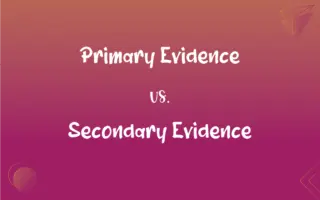Got vs. Have: What's the Difference?
Edited by Aimie Carlson || By Janet White || Published on November 30, 2023
"Got" often implies acquiring or receiving something, while "have" indicates possession, ownership, or necessity.

Key Differences
"Got" is commonly used to indicate the act of receiving or obtaining something. "Have," on the other hand, primarily signifies possession, ownership, or the state of holding something.
"Got" is the past tense of "get," reflecting an action completed in the past. "Have" is used in the present tense, denoting a current state or condition.
In everyday language, "got" is often used informally to denote acquisition or attainment. "Have" is more formally used to express possession, necessity, or obligation.
"Got" can be used informally in expressions like "got to" to indicate necessity or obligation. "Have" is used in more formal contexts to express obligations, as in "have to."
"Got" is frequently used in colloquial speech, sometimes replacing "have" in informal contexts. "Have" maintains a more formal and broad usage, applicable in various grammatical structures.
ADVERTISEMENT
Comparison Chart
Basic Function
Indicates acquiring or receiving
Indicates possession or state of holding
Tense
Past tense of "get"
Present tense form
Formality
More informal and colloquial
Formal and widely used in various contexts
Usage in Expressions
Used in informal expressions of necessity ("got to")
Used in formal expressions of obligation ("have to")
Grammatical Role
Mainly used as a verb
Used as a verb, auxiliary verb, and in other forms
ADVERTISEMENT
Got and Have Definitions
Got
Acquired or obtained something.
She got a letter in the mail.
Have
Undergo a particular experience.
We have dinner at eight.
Got
Came to understand something.
I finally got the joke.
Have
Own or hold something.
I have a new book.
Got
Managed to do something.
They got to climb the mountain.
Have
Express necessity or obligation.
You have to finish your work.
Got
Needed to do something (informal).
I got to leave early today.
Have
Suffer from an illness or condition.
She has a cold.
Got
Past tense and a past participle of get1.
Have
Organize or conduct an event.
They have a meeting scheduled.
Got
Expressing obligation; used with have.
I can't go out tonight: I've got to study for my exams.
Have
To be in possession of
Already had a car.
Got
Must; have/has (to).
I got to go study.
Have
To possess as a characteristic, quality, or function
Has a beard.
Had a great deal of energy.
Got
Have.
They got a new car.
He got a lot of nerve.
Have
To possess or contain as a constituent part
A car that has air bags.
Got
(Singlish) Have; there is.
Got problem is it?
Got ants over here.
Got
Marks the completive or experiential aspect.
Got
Past participle of get
By that time we'd got very cold.
I've got two children.
How many children have you got?
Got
Entered into a state or condition.
He got angry at the news.
FAQs
Can 'got' express understanding?
Yes, as in "I got what you mean."
Is 'got' always past tense?
Primarily, yes, it's the past tense of "get."
Does 'have' always imply ownership?
Not always; it can also indicate necessity or experiences.
Can 'have' indicate experiences?
Yes, it can describe undergoing experiences or activities.
Is 'have' used in obligations?
Yes, especially in formal contexts, like "have to do something."
Do 'got' and 'have' have different connotations?
Yes, "got" is more about acquisition, "have" is about possession or state.
Is 'have' versatile in usage?
Yes, it's used in various grammatical structures.
Is 'got' formal?
It's generally more informal and colloquial.
Can 'got' be used in formal writing?
It's less common; "have" is more suitable for formal contexts.
Is 'got' used in American English?
Yes, it's widely used in American English, often informally.
Are there idiomatic uses of 'have'?
Yes, like "have a good time."
Is 'have' used in questions about possession?
Yes, like "Do you have a pen?"
Can 'have' be an auxiliary verb?
Yes, in perfect tenses like "have gone."
Do 'got' and 'have' overlap in usage?
Sometimes, especially in informal American English.
Is 'have' used in expressions of health?
Yes, like "I have a headache."
Does 'got' imply immediacy in acquisition?
Often, it suggests recent acquisition or change.
Can 'got' be used instead of 'have' for possession?
Informally, yes, like "I got a car."
Can 'got' indicate a change of state?
Yes, such as "He got tired."
Can 'got' imply success?
In some contexts, like "finally got it."
Are there fixed phrases with 'got'?
Yes, like "got to go."
About Author
Written by
Janet WhiteJanet White has been an esteemed writer and blogger for Difference Wiki. Holding a Master's degree in Science and Medical Journalism from the prestigious Boston University, she has consistently demonstrated her expertise and passion for her field. When she's not immersed in her work, Janet relishes her time exercising, delving into a good book, and cherishing moments with friends and family.
Edited by
Aimie CarlsonAimie Carlson, holding a master's degree in English literature, is a fervent English language enthusiast. She lends her writing talents to Difference Wiki, a prominent website that specializes in comparisons, offering readers insightful analyses that both captivate and inform.






































































